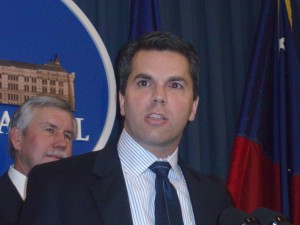What Does Redistricting Mean for Renewables in Texas?
Plans to revise Texas’ electoral boundaries will affect more than just the House of Representatives’ Republican-Democrat breakdown. But could it affect Texas’ renewable energy policies?
That was the question posed to State Rep. Mark Strama by Stratus Energy’s Mark Bruce at the University of Texas at Austin’s School of Law’s Wind, Solar and Storage conference last week. The answer revealed a lot about how attitudes towards subsidizing can be shaped by region, rather than partisan politics.
Mark Bruce: “How much does the redistricting matter as we go into the next round of Washington congressional action, and in the Texas legislature itself?”
Mark Strama: “In energy policy, what really seems to matter more is the personalities that are involved and where the leadership comes from. We’ve lost some good folks from West Texas. In many cases, [they were] Republicans who had made renewable energy an issue that was really bipartisan because their part of the state was making money from it. And they didn’t see it as this environmental crusade, [but rather] as a way of making money in their hometowns. Redistricting plays into that to an extent, just because each ten years we shift more power of the state away from rural Texas, and more toward urban and suburban Texas because that’s what the growth patterns in the state population have done. And that does have the effect of reducing the influence of those folks from the parts of the state where the wind blows and the sun shines, but where the population just isn’t big enough to control the legislature anymore.”
Bruce: “Is the rural urban composition change as important to these policy matters as the Republican-Democrat split?”
Strama: “It is, I think it is. Look, what helps is that when you get rural Republicans standing up saying wind is good for the state of Texas, and solar can be great for the state of Texas, you’re going to get a receptive audience from many urban democrats and suburban democrats with environmental constituencies. So you do still have the potential for this bipartisan dynamic around renewables.”
You can listen to the entire Q&A below:
